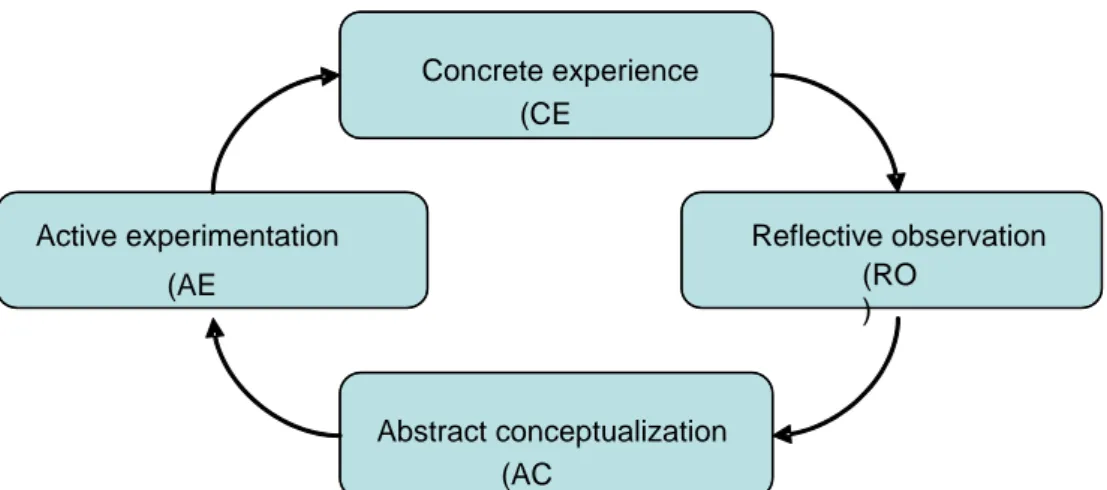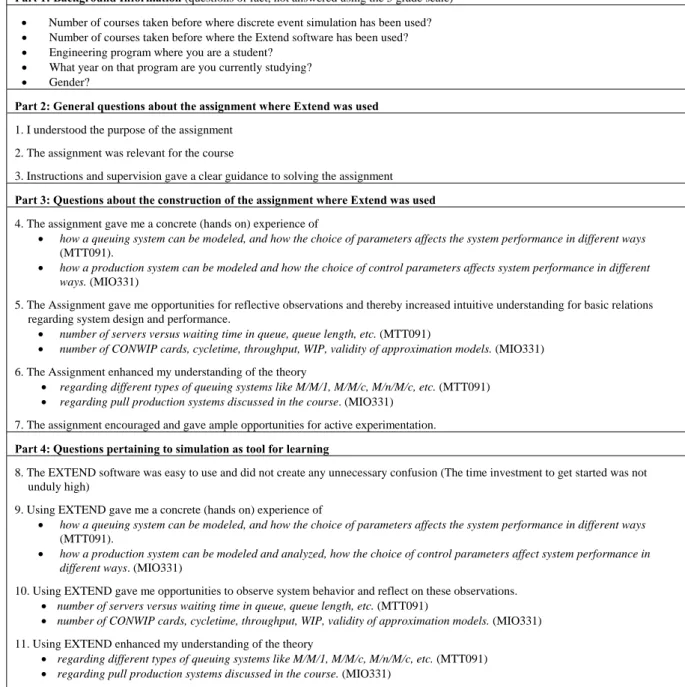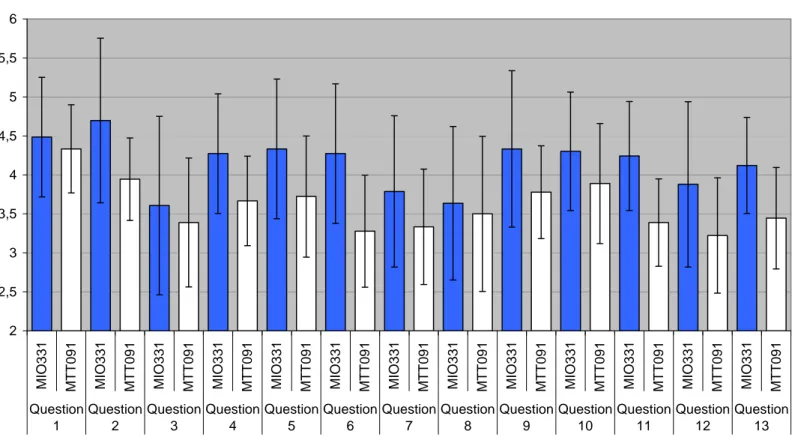Learning in logistics and operations
management using computer based simulation
Johan Lundin and Johan Marklund
Department of Industrial Management and LogisticsLund University, Faculty of Engineering
Abstract − In this study we investigate to what extent computer based discrete event simulation modeling can contribute to students’ learning processes in logistics and production management courses. Our interest in simulation stems from the fact that it is not possible to let students experiment with real logistics and production systems. This is an issue because the complexity and stochastic nature of these systems are inherently difficult to grasp. A potential remedy is to use a discrete event simulation software to create a computer model that can illustrate the dynamics of the system, and allow for experimentation. In our approach we define the learning process in accordance with Kolb’s model for experimental learning. We then use a survey on two different student groups to investigate how they perceive that simulation affects their learning process. Group 1 (students in a logistics course on G2 level) had no prior knowledge of the simulation tool. Group 2 (students in a production management course on Advanced level) had taken at least one course in simulation before. The results indicate that both student groups perceive simulation as a good tool to enhance their learning experience, but Group 2 (with the more senior and experienced students) valued the use of simulation more.
Index Terms: Computer based simulation, Extend, Experiential learning, Kolb’s learning cycle
I. INTRODUCTION
The purpose of this study is to investigate how students perceive that a discrete event simulation software package (Extend, by Imagine That Inc.) contribute to their learning experience in two different courses in logistics and production management. Our interest stems from teaching courses in this area, where a constant challenge is
to find ways to illustrate how the dynamics of complex stochastic logistics and production systems are affected by different control decisions. Abstract theoretical reasoning in a typical lecture format needs to be complemented with hands on experience to result in a deeper understanding about how these systems work. Manipulation of real logistics and production systems is for obvious reasons not an option. As an interesting alternative, Extend (and other similar simulation software) makes it possible to quickly build a computer model of a specific system. This model effectively illustrates the system’s dynamics (graphically and numerically) and allows for easy experimentation. The challenge is that Extend, like any other software, requires some technical skills to be used effectively. These requirements have been drastically reduced in later years, but still an initial time investment is needed. Clearly, the technical issues associated with using the software affect its pedagogical value, and how the students perceive that this tool support their learning process. Hence, a concrete motivation for our study is to gain a better understanding of this trade off, and ultimately whether using Extend as a tool for improved learning is worth the effort? The fact that skills in simulation modeling are important for an engineer from a technical point of view is uncontested.
Our study is based on the experiential learning theory by Kolb in [7], and particularly on his four stage learning cycle (see Figure 1). In this context, the purpose of our work translates into investigating how students perceive that the use of Extend can contribute to each of the four stages of learning, and thereby facilitate a completion of the learning cycle. Similar studies for other types of simulation tools and games are, for example, reported in [6], focusing on using simulation games in teaching economics, [4], focusing on using simulation games in a production environment,
Figure 1. The four stage learning cycle by Kolb (1984)
[5], focusing on the use of a simulation training factory for the electronics industry, and [2], focusing on experiential learning in an anaesthesia simulation centre for medical students.
The current study encompass students in two different courses during the spring semester 2008, one logistics course, MTT091 Materials handling (G2 level, 22 students), and one production management course, MIO331 Management of Production and Inventory Systems (Advanced level, 38 students). In the former, the students have no prior experience of using Extend, while in the latter; they have taken at least one course in simulation (Extend) modeling before. In each course, a survey was administered to determine the students’ perceptions of how the Extend assignments in the course attributed to the four stages in Kolb’s learning cycle. The surveys ask the same basic questions, but with customized formulations to fit the two student groups. The response rates were 87% for MIO331 and 82% for MTT091. The results show that the students in both courses value the simulation exercises and the use of Extend, but the more experienced students in MIO331 are more positive than the less experienced students in MTT091. From the students’ comments, the main reason appears to be that the latter group finds the technical difficulties with Extend to be more of an issue. This result is hardly surprising, but speaks to the importance of using a tool like Extend in several consecutive courses in order to leverage its full potential.
II. THEORETICAL FRAMEWORK AND
METHODOLOGY
As mentioned above, our study is based on the theory of experiential learning by Kolb in [7] and particularly the learning cycle summarized in
Figure 1. Kolb’s seminal work has its roots in earlier literature that advocate the importance of “learning by doing”, for example, [1], [3] and [8]. The four phases of Kolb’s learning cycle are: 1) Concrete experience, 2) Reflective observation, 3) Abstract conceptualization, and 4) Active experimentation. Learning can begin in any of the four phases, but according to Kolb effective learning requires that the cycle be completed.
The simulation assignments we study are structured in accordance with Kolb’s cycle with the intensions to offer opportunities for effective experiential learning.
The 13 questions used to measure how the students perceive that the simulation exercises in Extend contributed to their learning process are summarized in Figure 2. (The complete surveys can be obtained from the authors.) Each question was answered on a 5 grade scale, where 1 = Strongly disagree, 2 = Partly disagree, 3 = Indifferent, 4 = Partly agree, 5 = Strongly agree. The questions were complemented with ample space for comments.
The two surveys are identical except for a few formulations (examples) customized to the courses in question to assure their relevance from a student perspective. They are divided into four parts: Part 1: Background information, Part 2: General questions about the assignment where Extend was used, Part 3: Students’ perceptions about the construction of the exercise where Extend was used, and Part 4: Students perceptions about Extend as a tool for learning. The questions in Part 3 and 4 are directly linked to the phases of the learning cycle. The structure reflects an attempt to distinguish the students’ perceptions about the simulation tool Extend from their perceptions about the assignments as such.
Concrete experience (CE Abstract conceptualization (AC
2. Reflective
Reflective observation (RO ) Active experimentation (AEPart 1: Background Information (questions of fact, not answered using the 5 grade scale)
• Number of courses taken before where discrete event simulation has been used? • Number of courses taken before where the Extend software has been used? • Engineering program where you are a student?
• What year on that program are you currently studying? • Gender?
Part 2: General questions about the assignment where Extend was used
1. I understood the purpose of the assignment 2. The assignment was relevant for the course
3. Instructions and supervision gave a clear guidance to solving the assignment
Part 3: Questions about the construction of the assignment where Extend was used
4. The assignment gave me a concrete (hands on) experience of
• how a queuing system can be modeled, and how the choice of parameters affects the system performance in different ways (MTT091).
• how a production system can be modeled and how the choice of control parameters affects system performance in different
ways. (MIO331)
5. The Assignment gave me opportunities for reflective observations and thereby increased intuitive understanding for basic relations regarding system design and performance.
• number of servers versus waiting time in queue, queue length, etc. (MTT091)
• number of CONWIP cards, cycletime, throughput, WIP, validity of approximation models. (MIO331) 6. The Assignment enhanced my understanding of the theory
• regarding different types of queuing systems like M/M/1, M/M/c, M/n/M/c, etc. (MTT091) • regarding pull production systems discussed in the course. (MIO331)
7. The assignment encouraged and gave ample opportunities for active experimentation.
Part 4: Questions pertaining to simulation as tool for learning
8. The EXTEND software was easy to use and did not create any unnecessary confusion (The time investment to get started was not unduly high)
9. Using EXTEND gave me a concrete (hands on) experience of
• how a queuing system can be modeled, and how the choice of parameters affects the system performance in different ways (MTT091).
• how a production system can be modeled and analyzed, how the choice of control parameters affect system performance in
different ways. (MIO331)
10. Using EXTEND gave me opportunities to observe system behavior and reflect on these observations. • number of servers versus waiting time in queue, queue length, etc. (MTT091)
• number of CONWIP cards, cycletime, throughput, WIP, validity of approximation models. (MIO331) 11. Using EXTEND enhanced my understanding of the theory
• regarding different types of queuing systems like M/M/1, M/M/c, M/n/M/c, etc. (MTT091) • regarding pull production systems discussed in the course. (MIO331)
12. Using EXTEND enabled and encouraged active experimentation with the studied system.
13. Using EXTEND improved my intuitive understanding for basic relationships between system design and performance.
Figure 2. Summary of the questions posed in the administered surveys. Text in italics specifies the formulations that differ between the surveys in the two courses MTT091 and MIO331. Note that each survey only contained one of the alternative course specific formulations.
Survey results
2 2,5 3 3,5 4 4,5 5 5,5 6 MIO3 31 MT T 0 9 1 MIO3 31 MT T 0 9 1 MIO3 31 MT T 0 9 1 MIO3 31 MT T 0 9 1 MIO3 31 MT T 0 9 1 MIO3 31 MT T 0 9 1 MIO3 31 MT T 0 9 1 MIO3 31 MT T 0 9 1 MIO3 31 MT T 0 9 1 MIO3 31 MT T 0 9 1 MIO3 31 MT T 0 9 1 MIO3 31 MT T 0 9 1 MIO3 31 MT T 0 9 1 Question 1 Question 2 Question 3 Question 4 Question 5 Question 6 Question 7 Question 8 Question 9 Question 10 Question 11 Question 12 Question 13Figure 3. Summary of survey results. The bars show the average score on each question for MIO331 and MTT091, respectively. The tick marks associated with each bar indicate a confidence interval of ± one standard deviation (σ).
III. RESULTS AND ANALYSIS
Figure 3 summarizes the results from the surveys. A general observation is that the average score is well above three, which in light of the stated questions, we interpret as a positive feedback from the students as to the value of simulation. Comparing the results for the two courses, we first note that the differences are not statistically significant. Still, with that in mind, we observe that MIO331 consistently has a higher average score on the questions than MTT091. We believe that this is mainly due to the differences in the students’ experience of working with Extend. An assertion which is supported by the students’ own comments written on the surveys. Also, the assignment in MTT091 has a dual purpose of teaching simulation modeling in Extend, and illustrating the dynamics of a queuing system.
Looking at the individual questions, the responses to Questions 1-3 (Part 2) are all above three, indicating that the students felt they
understood the purpose of the assignment and that it was relevant for the course in question.
Questions 4-7 (Part 3) regarding the construction of the assignment where Extend was used, shows equally positive results. We conclude that the assignment gave the students a concrete experience, and opportunities for reflective observations and active experimentation. It also provided enhanced understanding of the relevant theory and a thorough understanding of how the theoretical model worked.
Questions 8-13 (Part 4), focusing on computer based simulation in Extend as a tool for learning, also received positive answers. However, as mentioned before there tend to be differences between students from the two courses. We interpret this as an indication of the learning curve for Extend. Students taking MTT091 are forced to use more of their time to learn the software, while students taking MIO331 can focus on solving the production management assignment. We conclude that the students generally found Extend easy to use and that it gave them a concrete experience of modeled system. Finally, the results indicate that using Extend enhanced the students understanding
of the relevant theory, and it provided them with opportunities for active experimentation with the studied systems. This concurs with the results regarding the construction of the assignment (Part 3).
In addition to the distinction between courses, we have also analyzed the survey data according to the other background information (see Figure 1). However, this analysis has been omitted as no distinct findings could be established.
IV. CONCLUSIONS
In conclusion, our results indicate that computer based simulation in Extend can be used as an important tool in logistics and production management courses to help take the students through Kolb’s learning cycle. A reasonable conjecture is that these results also hold for related subject areas, and other similar discrete event simulation software.
REFERENCES
[1] Argyris, C., and Schön, D., K., (1978), Organizational Learning: A Theory of Action Perspective, Addison-Wesley, Reading, MA, 1978.
[2] Cleave-Hogg, D., and Morgan, P. J., (2002), Experiential learning in an anaesthesia simulation centre: analysis of students’ comments, Medical Teacher, 1, pp. 23-26. [3] Dewey, J., (1938), Experience and Education,
Macmillan, New York, 1938.
[4] Galvão, J. R., Martins, P. G., and Gomes, M. R., (2000), Modeling reality with simulation games for a cooperative learning, Proceedings of the 2000 Winter Simulation Conference, Joines, J. A., Barton, R. R., Kang, K., and Fishwick, P. A., eds, pp. 1692-1697.
[5] Haapasalo, H., and Hyvönen, J., (2001), Simulating business and operations management – a learning environment for the electronics industry, International Journal of Production Economics, 73, pp. 261-272. [6] Herz, B., and Merz, W., (1998), Experiential
Learning and the Effectiveness of Economic Simulation Games, Simulation & Gaming, 29 (2), pp. 238-250.
[7] Kolb, D., A., (1984), Experiential learning: Experience as the source of learning and development. Englewood Cliffs, NJ: Prentice Hall, 1984.
[8] Lewin, K., (1951), Field theory in social sciences, Harper and Row, New York, 1951.


